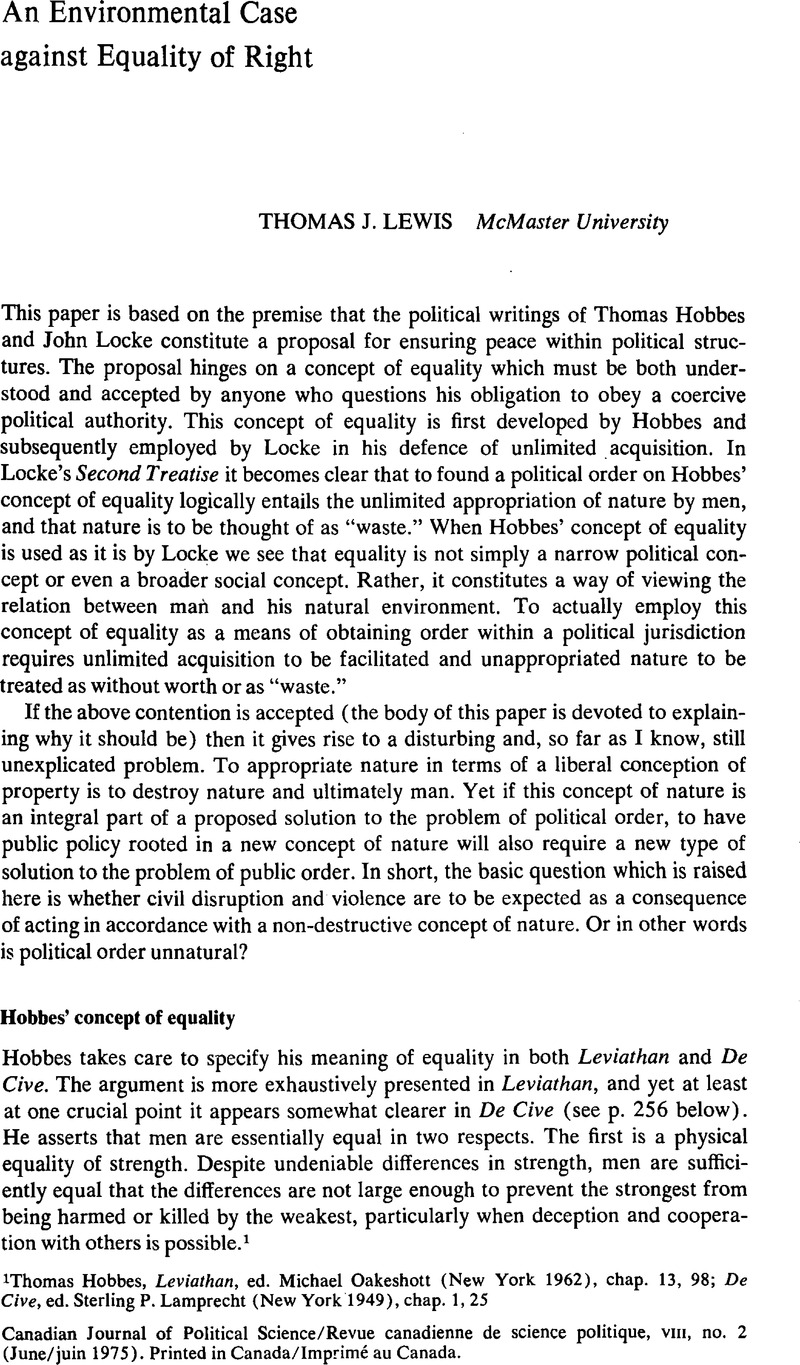Article contents
An Environmental Case against Equality of Right
Published online by Cambridge University Press: 10 November 2009
Abstract

- Type
- Articles
- Information
- Canadian Journal of Political Science/Revue canadienne de science politique , Volume 8 , Issue 2 , June 1975 , pp. 254 - 273
- Copyright
- Copyright © Canadian Political Science Association (l'Association canadienne de science politique) and/et la Société québécoise de science politique 1975
References
1 Hobbes, Thomas, Leviathan, ed. Oakeshott, Michael (New York 1962)Google Scholar, chap. 13, 98; De Cive, ed. Lamprecht, Sterling P. (New York 1949)Google Scholar, chap. 1, 25
2 Leviathan, chap. 13, 98
3 Ibid., chap. 3, 30–2
4 Ibid., chap, 13, 98
5 Ibid.
6 Ibid.
7 Chap. 3, 50
8 Leviathan, chap. 15, 120
9 The concept of a recommendation statement which is employed here is distinguished from other types of statements, particularly analytic and empirical statements, by Macdonald, Margaret, “Natural Rights,” Proceedings of the Aristotelian Society XLVII (1946–7), 225–50Google Scholar, reprinted in Readings in the Philosophy of Social Science, ed. Brodbeck, May (London 1968) 719–36.Google Scholar
10 This difficulty of moving from statements of fact to statements of obligation is confronted by C.B. Macpherson in his treatment of Hobbes’ concept of equality. See particularly The Political Theory of Possessive Individualism (London 1962), 74–87. Macpherson emphasizes the importance of the equality postulate, but treats it as an empirical statement. As a result he is faced with arguing that obligation can be derived from fact, but not in the sense of strict logical entailment.
11 I do not have anything to add to the debate provoked by Strauss, Leo, Natural Right and History (Chicago 1953), 165–261Google Scholar, and Cox, Richard H., Locke on War and Peace (New York 1960)Google Scholar, who both contend that Locke's political thought is essentially Hobbesian but in a carefully disguised form. Setting aside the question of Locke's intent, it is still possible to discern how his defence of unlimited acquisition serves as an argument for the acceptance of the Hobbesian concept of equality.
12 The Second Treatise of Government, ed. Peardon, Thomas P. (New York 1952)Google Scholar, sect. 4
13 Ibid.
14 Ibid., chap. 4
15 Ibid., chap. 5
16 Ibid., sect. 25
17 Ibid.
18 Ibid., sect. 27
19 Ibid.
20 Ibid., sect. 30
21 Ibid., sect. 36
22 Ibid.
23 Ibid., sect. 46
24 Ibid.
25 Ibid., sect. 37
26 This explication of the relationship between equality and, acquisition is very similar to Goldwin's, Robert A. treatment in his article, “John Locke,” in History of Political Philosophy, ed. Strauss, Leo and Cropsey, Joseph (Chicago 1963), 433–68.Google Scholar Goldwin demonstrates how the use of money justifies private-property and acquisition and then, demonstrates how Locke's view of property, is related to his concept of political power. But Goldwin does not probe the nature of the concept money. He follows Locke in explicating the function of money rather than the necessary conditions for the use of money.
27 The Second Treatise, sect. 50
28 The treatment of money here relies heavily on the explication of money as a circulating medium found in the work of Talcott Parsons; see his Sociological Theory and Modern Society (New York 1967), chaps. 8, 10, 11
29 The Second Treatise, sect. 19
- 5
- Cited by




